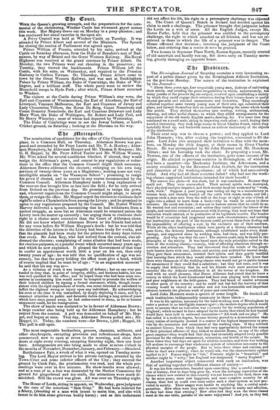gbt Itietropolis.
The nomination of candidates for the office of City Chamberlain took place, in a Common Hall, on Thursday. Alderman Brown was pro- posed and seconded by Sir Peter Laurie and Mr. T. A. Hankey ; Alder- man Humphery, by Alderman Hooper and Mr. Thomas B. Simpson ; Mr. G. H. Heppe!, by Mr. Peter Alfred Taylor and Mr. William Wansey. Mr. Wire asked the several candidates whether, if elected, they would resign the Alderman's gown, and concur in any regulations or reduc- tions in the office that the Common Council might think necessary. Alderman Brown addressed the electors ; enlarging on his own long services of twenty-three years as a Magistrate; making some not very intelligible attacks on "the Wansey an School " ; promising to resign his gown if elected, and to concur in any course recommended by the Common Council. Alderman Humphery made a long explanation of the reasons that brought him so late into the field ; for he only arrived from Ireland on the previous day. He promised to resign his gown, and, whatever regulations the Common Council might adopt, to accept them or resign the office. Mr. Heppel urged the electors to vindicate their rightlo select a Chamberlainfrom among the Livery ; and he promised to agree to any regulations proposed by the Council. Mr. Daniel Whittle Harvey delivered a speech, announcing that he had withdrawn from a useless struggle, as none but an Alderman could be returned unless the Livery took the matter up earnestly ; but urging them to vindicate their right to a choice more extensive than the Court of Aldermen alone. He did not know whether Alderman Brown or his friends had asked for any votes before Sir William Heygate's death ; but he was told that the direction of the letters to the Livery had been ready for weeks, and that the placards had been ready for the printers for many days before that event. Sir John Key, who had retired from the contest, also ad- dressed the electors; complaining of some allusion that had been made, for election purposes, to a painful event which occurred many years ago ; and which he now explained. It pleased the Government of that time to confer an appointment worth 3001. a year on his son, then only twenty years of age : he was told that no qualification of age was ne- cessary, but that the party holding the office must give a bond, which of course implied that he must be of age : "in an unguarded moment" he said that his son was so— As a violation of truth it was incapable of defence ; but no one ever pre- tended to deny that, in point of integrity, ability, and business habits, his son was well qualified for the office; and he hoped those who had been most cen- sorious in condemning him would never be tempted to promote the welfare of their beloved children by signing a formal statement, which, though incon- sistent with the rigid requirement of truth, was never intended or calculated to inflict the slightest wrong or injury upon any individual By acknowledging his error at the time it was committed, by deeply deploring it since, and by a constant attention to public and domestic duties during a long series of years which have since passed away, he had endeavoured to atone, as far as human atonement could, for his transgression.
The show of hands was declared to be in favour of Alderman Brown ; a large number also being held up for Alderman Humphery ; but he retired from the contest. A poll was demanded on behalf of Mr. Hep- pe!, and begun at once. That day, Alderman Brown polled 464; Mr. Heppe!, 11, Today, the numbers were—for Brown, 1,826; Ffeppel, 53. The poll is still open.
The most respectable booksellers, grocers, chemists, milliners, and other shopkeepers, excepting provision and refreshment-shops, have commenced now to open at seven in the morning, and close their doors at eight every evening, excepting Saturday night, then one hoar later. Arrangements are also being made to close at seven o'clock in the months of November, December, January, and February.—Standard.
Bartholomew Fair, a wreck of what it was, opened on Tuesday morn- ing. The Lord Mayor arrived in his private carriage, attended by the Town-Crier and some inferior officers of the City ; they entered the ground by Cloth Fair, the proclamation was read, and the whole pro- ceedings were over in five minutes. No show-booths were allowed ; and as a rent of 4s. a foot was demanded by the Market Committee for ground for gingerbread and toy-stalls, the attractions were much di- minished. Still the crowd was great. All was over on Thursday night.
The House of Lords, sitting in appeals, an Wednesday, gave judgment in the case of the notorious "Sam Gray." He had been indicted for a felony, (shooting at a man with intent to maim him, and also with intent to do him some grievous bodily harm) ; and as this indictment did not affect his life, his right to a peremptory challenge was objected to. The Court of Queen's Bench in Ireland had decided against his claim to such a challenge. The prisoner brought that judgment before the Lords on a writ of error. All the English Judges, except Mr. Baron Parke, held that the prisoner was entitled to the peremptory challenge, the right to which attached on all felonies, and was not re- stricted to those in which the life of a prisoner was in danger. The House affirmed that decision ; reversing the judgment of the Court below, and ordering that a venire de novo be granted.
Two houses in Seymour Place North, Euston Square, recently erected of old materials and hastily run-up, fell down early on Tuesday morn- ing, greatly damaging an opposite house.


























 Previous page
Previous page